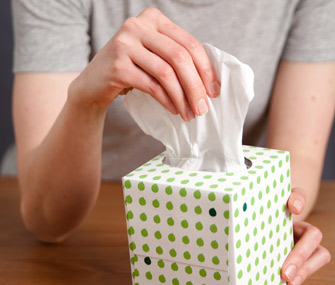Having Allergies Doesn’t Mean Passing on Pets
Published on June 24, 2013

Would you believe there are veterinarians who are allergic to animals? It’s absolutely true. In my 30-plus years as a practicing veterinarian, I have known not only veterinarians but also veterinary technicians and dog trainers who are allergic to animals. Of course, many of them have mild allergies — but not all. Some really have to work hard to manage their illnesses so they can continue to do the work they love.
Why would someone with allergies go into veterinary medicine? Some aspiring veterinarians don’t know they’re allergic to certain animals — horses, for example — until they’re in veterinary school. At that point, they figure they’ll muddle through their large-animal exposure and then limit their practice as much as possible to avoid the animals that trigger sneezing and wheezing.
But other veterinarians and veterinary technicians know pets make them sick, but they don’t care. They deal with it through a combination of medication and environmental management, and it works out pretty well.
No One Answer for Every Situation
Should people with allergies have pets? That depends. Studies show that 10 to 15 percent of the population are allergic, and many of those allergy sufferers own pets, to the point that many allergists have given up saying, “First, get rid of the pet,” and are willing to work with patients instead. Adults who are willing and able to manage their allergies with environmental controls and the support of a sympathetic allergist can make their own decisions. It's a lifestyle choice, and if your allergist won't work with you, try another. Medical support is critical, and you know what? Many allergists face these dilemmas too, including balancing the health of an allergic child with that child's intense desire to have a pet.
Which brings up the question: What about children? There is evidence that childhood exposure to pets can help prevent adult allergies, and that’s one of many reasons why I think a healthy pet is good for children. However, for a child with severe allergies, especially asthma, I am not so enthusiastic. I’m not a pediatrician, and I would defer to my colleagues on the human side in making recommendations about specific children and their allergies. My wife and I raised our two children around animals, and we’re both delighted that our daughter, Vetstreet pet behavior expert Mikkel Becker, is doing the same with our precious granddaughter. But if Reagan's health required a pet-free household, I’d support that decision.
The bottom line is to get all the information you can before making a decision. Some pets seem to trigger fewer allergies, and some breeds of dogs and cats are also anecdotally more acceptable to allergy sufferers. Don’t rely on Dr. Google in choosing such a pet, or in treating your allergies. A pet-friendly allergist is a must.
What Sneezy-Wheezy Veterinarians Know
While severe or life-threatening allergies will most likely require a pet-free home, many other people can manage to balance controlling allergies and living with pets by following a few tips:
Don't neglect your other allergies. Sometimes controlling them will give you enough "breathing room" to make life with your pets bearable. Remember always that allergies and asthma are serious health problems not to be taken lightly. Following the advice of your allergist cannot only make the difference between having a pet or not, but also between life and death for some people.
Establish your bedroom as a pet-free zone. More than one third of our lives is spent sleeping, and it's important to make that time less stressful for the body. Close off your bedroom and reduce dust-collecting surfaces by removing carpets and rugs, wall hangings, stuffed animals and collectibles from the room. Invest in an air purifier, keep air ducts and ceiling fans clean, and vacuum often. Banish feather pillows and down comforters. Choose hypo-allergenic bedding and use zippered, dustproof covers on the mattress and pillows. Combat dust mites by washing bedding frequently, in hot water. And yes, I mean it about the pets: Although there's not a pet lover alive who doesn't enjoy a purring cat on the bed, keeping the bedroom allergen-free is probably a necessary compromise for allergy sufferers.
Try to limit exposure to other allergens. Avoid cleaning solutions, cigarette smoke and strong perfumes, and consider using a mask when doing yard work. Or better yet, get someone else to mow.
Keep your pets clean and well-groomed. The best situation is for a non-allergic member of the family to take over these pet care chores. Frequent bathing and brushing of pets is a must — for cats as well as dogs. If you live alone, or if everyone in your house is allergic, consider sending your pet out for grooming. Brushing should be done outside — wear a mask and wash your hands afterward to minimize the irritation. And since allergens are in urine as well as saliva, get someone else to clean the litterbox — or use the mask and hand-washing approach if that’s not possible.
The most import tip I can offer? Wash your hands. If you get in the habit of washing your hands after petting an animal, you’ll be surprised how much less often you’ll be dealing with itchy, watery eyes and the sniffles. That’s because your own hands are the means by which allergy triggers get delivered to your eyes and nose.
We veterinarians, like all health-care professionals, wash our hands constantly. And that’s probably a large part of the reason why our own allergies don't slow us down at work, or keep us from being around the animals we love.
Read more Vetstreet articles about house cleaning and dealing with allergies:
8 Spring Cleaning Tips for Pet Owners
You'd Be Surprised Where Pet Hair Lurks
Are Your Guests Allergic to Pets? Here Are 5 Ways to Make Them More Comfortable

